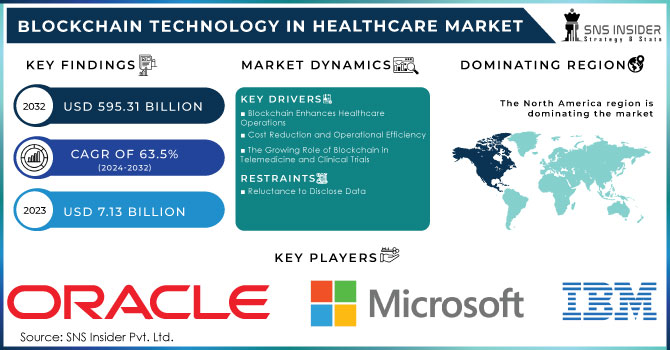Industry Analysis: Blockchain Technology in Healthcare Market Size, Share & Growth 2024-2032
Industry Analysis: Blockchain Technology in Healthcare Market Size, Share & Growth 2024-2032
|
In recent years, the integration of blockchain technology within the healthcare sector has accelerated significantly, driven by a demand for secure, efficient, and transparent data management solutions. According to SNS Insider's latest report, Blockchain Technology in Healthcare Market Revenue, this market is set to experience exponential growth due to blockchain’s potential to streamline processes, enhance data security, and foster a more reliable health information exchange system.
Healthcare’s adoption of blockchain technology offers numerous benefits, including improved patient privacy, optimized data interoperability, and reduction in fraud. Unlike traditional data systems, blockchain secures data through a decentralized network, making it less susceptible to data breaches and unauthorized access. This security is essential in healthcare, where sensitive patient information is at constant risk. As a result, blockchain solutions are becoming indispensable in patient data management, drug traceability, billing systems, and other critical applications within the healthcare industry. The report highlights that blockchain technology not only strengthens data privacy and accuracy but also improves patient outcomes through real-time data accessibility and accountability across networks. Healthcare providers, insurers, and pharmaceutical companies are investing in blockchain as a means to modernize and streamline their operational frameworks, moving towards a more patient-centric model that relies on trust and transparency. Furthermore, the report notes a significant increase in partnerships between healthcare institutions and tech providers to develop blockchain-based applications tailored to the industry’s unique needs. Get Free Sample Report @ https://www.snsinsider.com/sample-request/2196 Key Market Drivers and Challenges1. Enhanced Security and Compliance: As the healthcare sector grapples with stringent regulatory requirements, blockchain provides a secure infrastructure to manage and safeguard patient information. By using encryption and decentralized data validation methods, blockchain enhances data privacy and reduces the risk of tampering, thus ensuring compliance with regulatory bodies such as HIPAA and GDPR. 2. Cost Reduction and Process Optimization: Blockchain's transparent and automated framework eliminates intermediaries in transactions, reducing administrative costs and expediting processes like claims management and medical billing. The technology has the potential to eliminate redundancy and enhance data integrity, translating into significant cost savings for healthcare organizations. 3. Drug Supply Chain Management: Blockchain is also revolutionizing the pharmaceutical supply chain by providing a transparent and traceable ledger of transactions, which is essential for preventing counterfeit drugs. By tracking drugs from manufacturers to patients, blockchain reduces the likelihood of fake medications reaching consumers and ensures product authenticity. Future Scope and Market OutlookSNS Insider's report projects sustained growth in blockchain technology adoption across healthcare, driven by advancements in IoT, artificial intelligence, and interoperability solutions. As blockchain technology continues to mature, healthcare organizations are expected to develop and adopt more sophisticated applications, including blockchain-powered smart contracts for streamlined healthcare management, as well as blockchain-based wearable devices for real-time patient monitoring. With healthcare systems across the globe facing unprecedented demand for efficient data solutions, blockchain technology stands as a pivotal innovation capable of addressing multiple industry challenges. The market is forecasted to expand as healthcare providers recognize blockchain’s potential to improve data transparency, minimize fraud, and ensure quality in patient care. About Us Contact Us: Mayur Pande |
| Free forum by Nabble | Edit this page |


